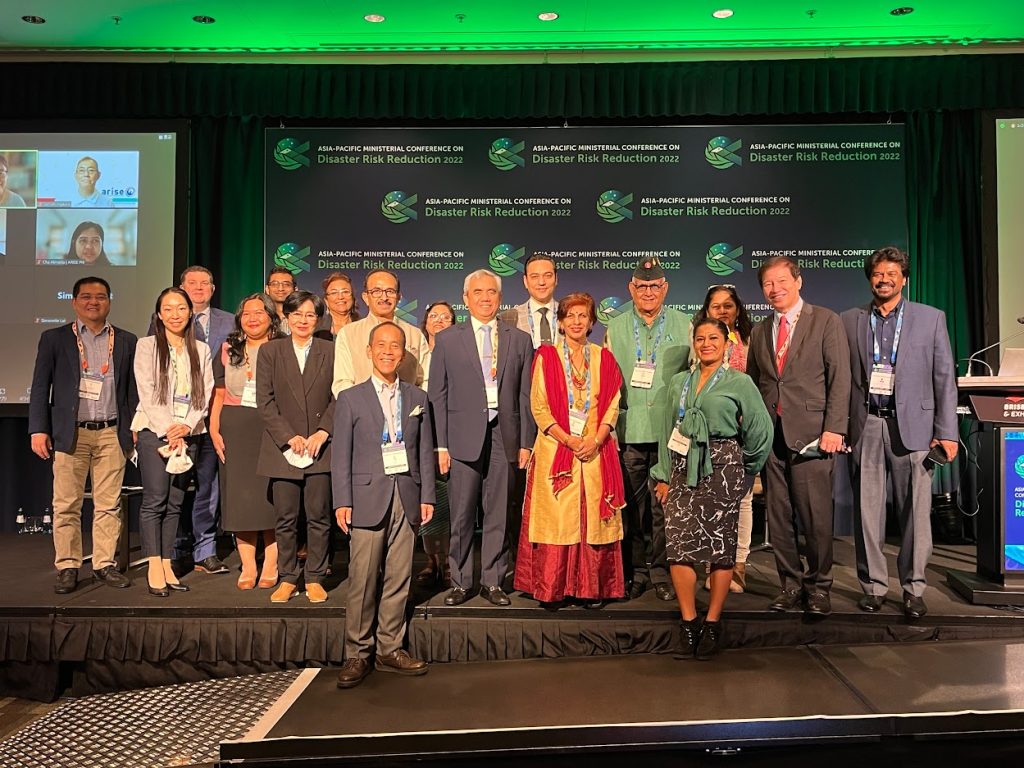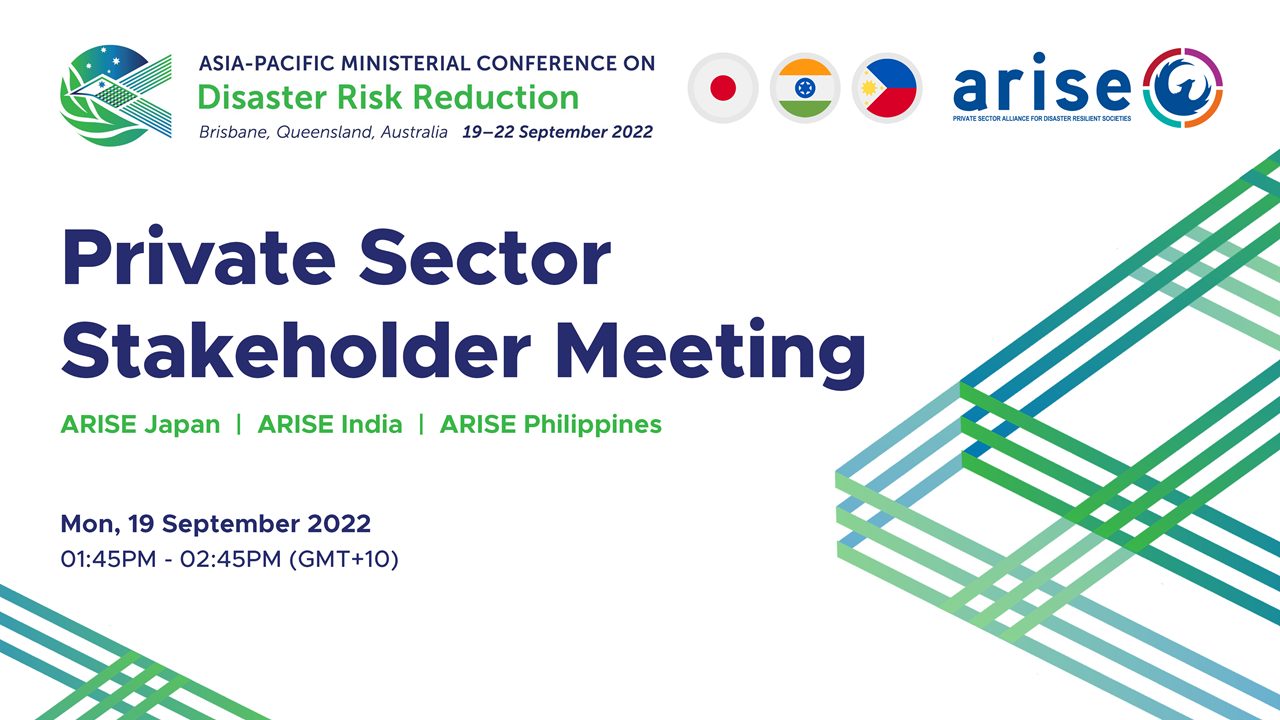
The APMCDRR Private Stakeholder Meeting: On challenges, wins and way forward in DRR in the APAC
Brisbane, Australia – The Asia-Pacific Ministerial Conference on Disaster Risk Reduction 2022 (APMCDRR) officially kicked off on September 19, 2022. It is a 4-day event carrying the theme, “From Crisis to Resilience: Transforming the Asia-Pacific region’s future through disaster risk reduction.” APMCDRR 2022 resumes at a critical moment along with the Midterm review of the Sendai Framework for Disaster Risk Reduction (SFDRR) 2015-2030.
During the opening day, a hybrid Private Stakeholder Meeting among ARISE members of the Asia-Pacific region was held to hear each other’s strategies and activities in implementing the Sendai Framework. Yuki Matsuoka, Head of the UNDRR Office in Japan, emphasized the role of the private sector in the Sendai Framework shifting the regard for stakeholders as victims and vulnerable into agents of change with a focus on empowerment and inclusion.
Three ARISE networks in the Asia-Pacific region, namely: India, the Philippines, and Japan, came forward to share their status in achieving the targets of the Sendai Framework as well as their initiatives and activities in realizing these targets.
ARISE India: Innovation and capacity development
Dr. Baghat Khanna, the CEO of ARISE India, reported their focus on creating innovation to support MSMEs who were hard hit during the COVID-19 pandemic. Some innovative solutions promoted were the Bio Attenuator for protection from virus transmission in closed spaces and the Quick Risk Evaluation (QRE) tool to enable self-assessment and preventive measures. QRE was developed by ARISE India members, RIKA INDIA and ADPC. Both of these innovations aimed to maintain business continuity. Various capacity development programs, workshops, and video conferences were held to develop resilience in industrial infrastructure, and minimize economic losses due to natural hazards, earthquakes, and fire safety in industries.
A new technology for harnessing water from the air to be used for drinking and purifying flood water into drinking water was also shared in his talk. ARISE India is willing to share more about it with other ARISE networks.
ARISE Philippines: Inclusivity and mainstreaming DRR
Vice Admiral Alexander Pama (Ret.), Co-Chair of ARISE Philippines, imparted their efforts’ focus on SFDRR Priority for Action 1, Understanding Risk. They organized Work Themes and Priority Areas (PAs) to help initialize DRR strategies and programs that could help in promoting resilience across communities.
Together with its member organizations, an inclusive approach was undertaken in prioritizing the needs of the most vulnerable sectors by institutionalizing joint projects to support MSMEs in their business continuity plans, including pre-disaster recovery preparations.
A pilot run for the Resilient Reporting Tool (RRT) was conducted in collaboration with Aboitiz Foundation, Resilient.ph and the Asian Institute of Management (AIM), aiming to mainstream the organizations’ disclosures of their disaster risk reduction contributions to Sendai Framework.
Co-Chair Pama highlighted ARISE Philippines’ active contribution to strategic policy implementation. One concrete example is the mainstreaming of DRR and resilience efforts in the ESG plans of its member companies as an integral part of their core business value cycle and GRI reporting.
ARISE Japan: Knowledge-sharing and a focus on tourism
Masato Takamatsu, Lead ARISE Japan and Tourism Resilience Japan, presented ARISE Japan’s progress in reaching the targets of SFDRR. Most of their efforts centered on sharing information and knowledge among the member companies and relevant communities. Since 2019, the Annual Public Symposium has been conducted and attended by both ARISE members and the public. Central to its themes are DRR among the private sector, tourism and resilience to disasters, going local in DRR toward creating disaster resilient communities, and strengthening SMEs as a community.
ARISE Japan-ARISE Philippines Knowledge-Sharing Sessions were organized to share information and experience according to the four ARISE priorities: MSMEs, infrastructure, insurance, and investment.
ARISE Japan continues to raise DRR awareness for ongoing initiatives such as the Tourism Crisis Management and Business Continuity Improvement pilot project for various tourism-related SMEs through partnerships with chambers of commerce and industry.
Private Sector Engagement: Tourism, communication, and training
The Private Sector Stakeholder Meeting featured two speakers who shared their private sector engagement in the Pacific and Australia.
Fantasia Lockington of Fiji Hotels and Tourism Association discussed the challenges of Fiji’s tourism sector during the height of the pandemic and how they successfully won it back. They took an approach addressing four critical areas among the private sectors which focused on ramping up vaccinations, creating an effective communication strategy for their resiliency initiatives, guaranteeing short- and long-term support for businesses in complying with pandemic protocol requirements to keep the lights on in Fiji’s private and tourism sectors and increasing the public sector’s confidence that the private sector can deliver its promises, like gaining the Ministry of Health’s assurance for their accurate reporting of pandemic-related data.
Lockington ended by reflecting on how this experience taught the private sector that they should always keep up with the DRR efforts for natural or geopolitical hazards. They acknowledged the importance of creative thinking and ensuring access to resources.
The last speaker was Rod Crowder of Disaster Recovery Insitute (DRI) Australia and New Zealand. DRI is a non-profit that helps organizations prepare for and recover from disasters by providing education, accreditation, and thought leadership in business continuity and related fields.
The in-depth courses they offer range from introductory to master level and specialty certifications not only for individuals or organizations in the DRR sector but also for the general public. DRI also uses various platforms like blogs, monthly newsletters, and information and dissemination campaigns to put back what DRR is about to the communities. DRI will continue to partner with different governments and organizations. It offers certifications like Resilient Enterprise and Hub of Resilience for organizations to be catalysts of resilience in their respective communities.
The article above is a condensed version, you may click here for a copy of the full report of the APMCDRR Private Stakeholder Meeting.

